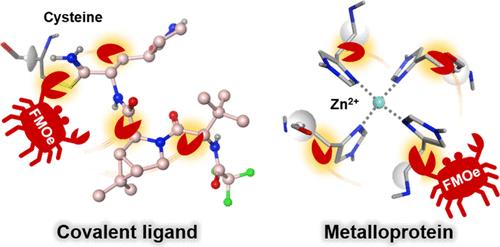当前位置:
X-MOL 学术
›
J. Chem. Inf. Model.
›
论文详情
Our official English website, www.x-mol.net, welcomes your
feedback! (Note: you will need to create a separate account there.)
FMOe: Preprocessing and Visualizing Package of the Fragment Molecular Orbital Method for Molecular Operating Environment and Its Applications in Covalent Ligand and Metalloprotein Analyses
Journal of Chemical Information and Modeling ( IF 5.6 ) Pub Date : 2024-09-05 , DOI: 10.1021/acs.jcim.4c01169 Hirotomo Moriwaki 1 , Yusuke Kawashima 2 , Chiduru Watanabe 1, 3 , Kikuko Kamisaka 1 , Yoshio Okiyama 4 , Kaori Fukuzawa 2, 5 , Teruki Honma 1
Journal of Chemical Information and Modeling ( IF 5.6 ) Pub Date : 2024-09-05 , DOI: 10.1021/acs.jcim.4c01169 Hirotomo Moriwaki 1 , Yusuke Kawashima 2 , Chiduru Watanabe 1, 3 , Kikuko Kamisaka 1 , Yoshio Okiyama 4 , Kaori Fukuzawa 2, 5 , Teruki Honma 1
Affiliation

|
The fragment molecular orbital (FMO) method is an efficient quantum chemical calculation technique for large biomolecules, dividing each into smaller fragments and providing interfragment interaction energies (IFIEs) that support our understanding of molecular recognition. The ab initio fragment MO method (ABINIT-MP), an FMO processing program, can automatically divide typical proteins and nucleic acids. In contrast, small molecules such as ligands and heterosystems must be manually divided. Thus, we developed a graphical user interface to easily handle such manual fragmentation as a library for the Molecular Operating Environment (MOE) that preprocesses and visualizes FMO calculations. We demonstrated fragmentation with IFIE analyses for the two following cases: (1) covalent cysteine–ligand bonding inside the SARS-CoV-2 main protease (Mpro) and nirmatrelvir (Paxlovid) complex and (2) the metal coordination inside a zinc-bound cyclic peptide. IFIE analysis successfully identified the key amino acid residues for the molecular recognition of nirmatrelvir with Mpro and the details of their interactions (e.g., hydrogen bonds and CH/π interactions) via ligand fragmentation of functional group units. In metalloproteins, we found an efficient and accurate scheme for the fragmentation of Zn2+ ions with four histidines coordinated to the ion. FMOe simplifies manual fragmentation, allowing users to experiment with various fragmentation patterns and perform in-depth IFIE analysis with high accuracy. In the future, our findings will provide valuable insight into complicated cases, such as ligand fragmentation in modality drug discovery, especially for medium-sized molecules and metalloprotein fragmentation around metals.
中文翻译:

FMOe:用于分子操作环境的片段分子轨道方法的预处理和可视化包及其在共价配体和金属蛋白分析中的应用
片段分子轨道 (FMO) 方法是一种用于大生物分子的高效量子化学计算技术,将每个生物分子分成更小的片段,并提供片段间相互作用能 (IFIE),以支持我们对分子识别的理解。ab initio fragment MO method (ABINIT-MP) 是一种 FMO 处理程序,可以自动分割典型蛋白质和核酸。相比之下,配体和异源系统等小分子必须手动分裂。因此,我们开发了一个图形用户界面来轻松处理此类手动碎片化,作为分子操作环境 (MOE) 的库,用于预处理和可视化 FMO 计算。我们用 IFIE 分析证明了以下两种情况的碎裂:(1) SARS-CoV-2 主蛋白酶 (Mpro) 和 nirmatrelvir (Paxlovid) 复合物内的共价半胱氨酸-配体键,以及 (2) 锌结合环肽内的金属配位。IFIE 分析通过官能团单元的配体碎裂成功鉴定了 nirmatrelvir 与 Mpro 分子识别的关键氨基酸残基以及它们相互作用的细节(例如,氢键和 CH/π 相互作用)。在金属蛋白中,我们发现了一种高效且准确的 Zn2+ 离子碎裂方案,其中四个组氨酸与离子配位。FMOe 简化了手动碎裂,允许用户试验各种碎裂模式,并以高精度执行深入的 IFIE 分析。未来,我们的研究结果将为复杂情况提供有价值的见解,例如模式药物发现中的配体碎裂,特别是对于中型分子和金属周围的金属蛋白碎裂。
更新日期:2024-09-05
中文翻译:

FMOe:用于分子操作环境的片段分子轨道方法的预处理和可视化包及其在共价配体和金属蛋白分析中的应用
片段分子轨道 (FMO) 方法是一种用于大生物分子的高效量子化学计算技术,将每个生物分子分成更小的片段,并提供片段间相互作用能 (IFIE),以支持我们对分子识别的理解。ab initio fragment MO method (ABINIT-MP) 是一种 FMO 处理程序,可以自动分割典型蛋白质和核酸。相比之下,配体和异源系统等小分子必须手动分裂。因此,我们开发了一个图形用户界面来轻松处理此类手动碎片化,作为分子操作环境 (MOE) 的库,用于预处理和可视化 FMO 计算。我们用 IFIE 分析证明了以下两种情况的碎裂:(1) SARS-CoV-2 主蛋白酶 (Mpro) 和 nirmatrelvir (Paxlovid) 复合物内的共价半胱氨酸-配体键,以及 (2) 锌结合环肽内的金属配位。IFIE 分析通过官能团单元的配体碎裂成功鉴定了 nirmatrelvir 与 Mpro 分子识别的关键氨基酸残基以及它们相互作用的细节(例如,氢键和 CH/π 相互作用)。在金属蛋白中,我们发现了一种高效且准确的 Zn2+ 离子碎裂方案,其中四个组氨酸与离子配位。FMOe 简化了手动碎裂,允许用户试验各种碎裂模式,并以高精度执行深入的 IFIE 分析。未来,我们的研究结果将为复杂情况提供有价值的见解,例如模式药物发现中的配体碎裂,特别是对于中型分子和金属周围的金属蛋白碎裂。































 京公网安备 11010802027423号
京公网安备 11010802027423号